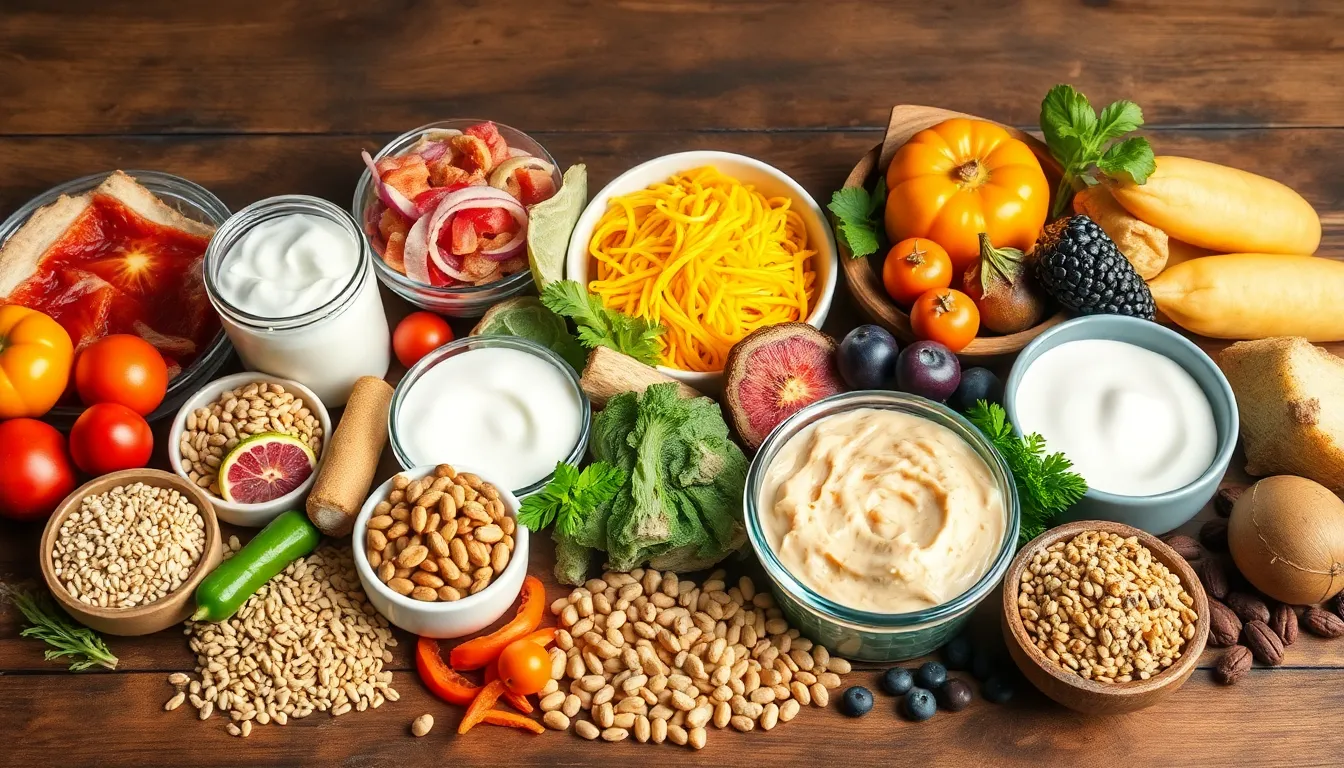Table of Contents
ToggleIn today’s fast-paced world, maintaining digestive health is more important than ever. With the rise of processed foods and hectic lifestyles, many people struggle with digestive issues that can impact their overall well-being. Fortunately, incorporating specific foods into one’s diet can significantly improve gut health and enhance digestion.
Digestive health foods, rich in fiber, probiotics, and essential nutrients, play a crucial role in promoting a balanced digestive system. From yogurt to leafy greens, these foods not only support digestion but also boost immunity and energy levels. Understanding the benefits of these foods can empower individuals to make informed dietary choices that lead to a healthier, happier life.
Importance Of Digestive Health Foods
Digestive health foods play a crucial role in maintaining overall well-being. These foods help support the body’s digestive system by improving gut health and preventing common issues such as bloating, constipation, and indigestion.
Fiber-rich foods promote regular bowel movements. Foods such as whole grains, fruits, and vegetables increase fiber intake, aiding digestibility and enhancing gut motility. Regular consumption of fiber lowers the risk of diverticulitis and colorectal cancer.
Probiotic foods enhance gut flora. Yogurt, kefir, and fermented foods contain beneficial bacteria that help maintain a balanced microbiome. A healthy gut microbiome can boost immunity and reduce inflammation.
Essential nutrients support digestion. Foods rich in vitamins and minerals, like leafy greens and nuts, provide necessary nutrients that support enzymatic functions. Adequate nutrition encourages better digestion and nutrient absorption.
Hydration complements digestive health. Sufficient water intake is vital for digestion. Foods with high water content, such as cucumbers and watermelon, contribute to hydration and promote healthy digestion by softening stools.
Anti-inflammatory foods reduce digestive discomfort. Ingredients like ginger and turmeric contain properties that mitigate inflammation in the digestive tract. Regular consumption can alleviate symptoms of digestive disorders.
Incorporating these digestive health foods into daily meals fosters a proactive approach to maintaining digestive wellness.
Types Of Digestive Health Foods

Various foods contribute to digestive health, primarily through probiotics and fiber. Incorporating these foods into daily meals can significantly enhance gut function and overall well-being.
Probiotic-Rich Foods
Probiotic-rich foods contain beneficial bacteria that support a balanced gut microbiome. Common examples include:
- Yogurt: Contains live cultures that promote healthy digestion.
- Kefir: Fermented milk drink packed with probiotics and nutrients.
- Sauerkraut: Fermented cabbage that aids in digestion and provides antioxidants.
- Kimchi: Spicy Korean dish that combines fermented vegetables, enhancing gut health.
- Miso: Fermented soybean paste rich in probiotics and nutrients.
Each of these foods aids in increasing the number of healthy bacteria in the gut, which can boost immunity, reduce inflammation, and alleviate digestive issues.
Fiber-Filled Foods
Fiber-filled foods play a crucial role in digestive health by promoting regular bowel movements and preventing constipation. Key examples include:
- Whole Grains: Foods like brown rice, quinoa, and oatmeal provide soluble and insoluble fiber.
- Fruits: Apples, berries, and bananas contain both fiber and essential vitamins.
- Vegetables: Leafy greens, carrots, and broccoli are high in fiber and water content.
- Legumes: Beans, lentils, and chickpeas are excellent sources of fiber and protein.
- Nuts and Seeds: Almonds, chia seeds, and flaxseeds offer healthy fats and fiber.
These foods facilitate digestion, lower cholesterol levels, and can reduce the risk of serious digestive disorders. Regular consumption supports optimal gut health and enhances nutrient absorption.
Benefits Of Digestive Health Foods
Digestive health foods provide various advantages for overall well-being. They support bodily functions and enhance vitality through improved digestion and immune responses.
Improved Digestion
Improved digestion results from regular consumption of fiber-filled and probiotic-rich foods. Fiber-rich foods, including whole grains and fruits, promote regular bowel movements by adding bulk and softening stools. Probiotic foods, like yogurt and sauerkraut, introduce beneficial bacteria into the gut, fostering balance in the microbiome. This balance reduces common issues such as bloating, gas, and constipation. Moreover, a healthy digestive system optimizes nutrient absorption, ensuring the body receives essential vitamins and minerals.
Enhanced Immunity
Enhanced immunity stems from the inclusion of digestive health foods in a diet. Probiotics, found in fermented products, bolster the gut’s defense against harmful pathogens. A balanced gut microbiome strengthens the immune response, decreasing the likelihood of infections and illnesses. Additionally, fiber-rich foods contribute to a healthier gut environment, supporting immune function by promoting the growth of beneficial bacteria. This support leads to a reduction in inflammation, further solidifying the connection between digestion and immunity.
How To Incorporate Digestive Health Foods Into Your Diet
Incorporating digestive health foods into daily meals supports gut health and overall well-being. This section presents practical meal ideas and tips for effectively including these foods in a balanced diet.
Meal Ideas
- Breakfast Options: Start the day with yogurt topped with fresh fruits and nuts. This combination provides probiotics and fiber. Oatmeal cooked with almond milk and served with berries offers a fiber-rich, filling meal.
- Lunch Suggestions: Prepare a salad with leafy greens, chickpeas, and various colorful vegetables drizzled with olive oil and lemon juice. A whole-grain wrap filled with turkey, spinach, and avocado also boosts fiber and nutrient intake.
- Snack Ideas: Opt for raw veggies with hummus or a handful of mixed nuts for a satisfying, fiber-laden snack. Edamame and fruit like apples or pears deliver additional fiber support.
- Dinner Choices: Enjoy grilled salmon or chicken served with quinoa and steamed broccoli. This meal combines lean protein with fiber-rich grains and vegetables. A stir-fry with tofu, bell peppers, and brown rice showcases a colorful array of nutrients and fiber.
Tips For Success
- Plan Meals: Set aside time each week to plan meals that include digestive health foods. This practice reduces reliance on processed options.
- Incorporate Gradually: Introduce fiber and probiotics slowly. This approach helps the body adjust and minimizes digestive discomfort.
- Stay Hydrated: Drink plenty of water throughout the day. Adequate hydration aids in digesting fiber-rich foods and prevents constipation.
- Read Labels: Choose foods with probiotics, such as yogurt, kefir, or fermented vegetables. Ensure they contain live active cultures.
- Be Creative: Experiment with different recipes that feature digestive health foods. Creativity can make healthy eating enjoyable and varied.
- Monitor Portion Sizes: Balance portion sizes of fiber-rich foods to maintain digestive comfort while ensuring adequate intake.
Embracing digestive health foods can significantly enhance overall well-being. By focusing on a balanced diet rich in probiotics and fiber, individuals can improve their digestion and support a healthier gut microbiome. Making conscious dietary choices not only alleviates common digestive issues but also boosts immunity and energy levels.
Incorporating a variety of these foods into daily meals promotes regular bowel movements and optimizes nutrient absorption. With practical meal ideas and tips at hand, anyone can easily integrate these beneficial foods into their lifestyle. Prioritizing digestive health is a proactive step toward achieving vitality and long-term wellness.






